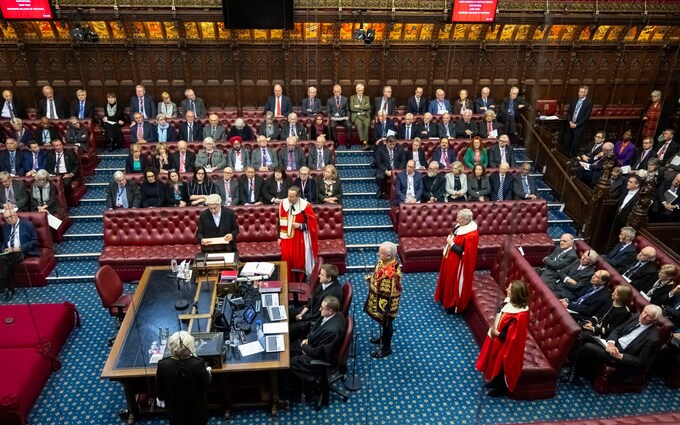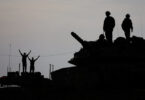Philip Johnston
Parliament works in mysterious ways, its wonders to perform. The House of Lords gave the Rwanda Bill a Second Reading on Monday but merely delayed the monumental crunch that is coming over this legislation. A Lib Dem motion to kill the Bill was defeated, but not because there was support in the Lords for the measure. Far from it.
The Government secured a majority for its efforts to send would-be immigrants to the African republic, even though most speakers registered their opposition.
Lord Blunkett, the former home secretary, said peers were being invited to walk into a trap if they voted it down because ministers would say the policy could have worked if only the unelected House had not thwarted their wishes. Rishi Sunak said as much after getting his Bill through the Commons 12 days ago. “The treaty with Rwanda is signed and the legislation which deems Rwanda a safe country has been passed unamended in our elected chamber,” he declared. “There is now only one question: will the opposition in the appointed House of Lords try and frustrate the will of the people as expressed by the elected house?”
This is dangerous territory for a Conservative prime minister. Many a crime has been committed in the name of the people, which is the sort of demotic appeal you expect to hear from the Left. His reference to the “appointed House” was a deliberate swipe at its undemocratic make-up, even though many of its members are former ministers put there by Mr Sunak and his predecessors. One of them, Lord Clarke of Nottingham, the former chancellor and three times Tory leadership contender, was having none of it, conjuring up Lord Hailsham’s 1976 warning of “an elective dictatorship”. He was hitherto a supporter of the Rwanda policy because a credible and effective crackdown on illegal migration was required to reassure the public that we have control over our borders.
“If they think we have lost control, that threatens a very nasty change in public attitudes caused by doubts,” he said. Lord Clarke was prepared to accept that sending migrants to a safe third country for processing was proportionate. But the Supreme Court changed everything in November when judges ruled Rwanda was not safe because of the risk of further repatriation to a place of possible danger, known as refoulement. This was a finding of fact, though one that relied heavily on evidence from the UNHCR, the UN refugee agency, which could be accused of being parti pris.
The principle of non-refoulement prohibits the expulsion, whether directly or indirectly, of a refugee to a country of persecution. It is enshrined in the 1951 Refugee Convention and given effect by other international treaties to which the United Kingdom is a party. The obvious remedy is for the Government to pull out of all these treaties, something it is unwilling to do, not least because it would not get through Parliament. Moreover, as the Supreme Court observed, the general prohibition on refoulement binds all states regardless of whether they are party to any treaties that give it effect.
The mass movement of people, which has only just begun, will confront countries in Europe with an increasingly acute dilemma as the years pass. Already they are trying to farm out their obligations under these treaties to other countries, not just Rwanda. Italy is sending asylum seekers to Albania to have their cases heard and processed. If the applicant succeeds in proving a well-founded fear of persecution, they will return to Italy. The British version is that they will remain in Rwanda.
In order for this to be lawful, the Government has declared Rwanda to be safe, whatever the Supreme Court or the UNHCR has said. Its difficulty in making this case has been compounded by the fact that Rwandans have successfully claimed asylum in the UK on the grounds that their home country is unsafe. Politics is full of ironies but the inversion of attitudes to the House of Lords caused by this episode is particularly dramatic. Suddenly, Left-wingers, who have for years derided the Upper chamber as an undemocratic excrescence, now see it as a great bulwark against a ruthless Tory administration prepared to wreck Britain’s reputation for upholding the rule of law.
On the other hand, Right-wing traditionalists, who previously would die in a ditch to keep the House of Lords pretty much as it is, want it abolished. The passions raised by the Rwanda Bill have turned normal political discourse on its head. It has so addled minds that otherwise sensible people are making stupid decisions and even sillier speeches. Why Mr Sunak decided to pin his entire premiership to the removal of a few hundred (at most) migrants to Rwanda will have historians scratching their heads in perplexity.
We are talking of around 40,000 people crossing the Channel. Yes, they try to jump the queue, get put up in hotels, claim benefits and make false asylum claims. Yes, the Government has to try to stop the traffic. But its failure to do so will simply expose its powerlessness because it is not prepared to do the one thing that would work – return them immediately to the French beaches they came from. Even if the Bill goes through Parliament and flights take off for Rwanda, the numbers involved will be laughably small. Mr Sunak will get no kudos for the simple reason that everyone knows that legal immigration, which the Government can control, is at stratospheric levels. This has caused the population to boom, as the latest ONS figures show, putting pressure on already creaking public services.
To get this Bill on to the statute book will involve more grief than it can possibly merit. The Lib Dem attempt to strangle it at birth failed, but that was just the start. When it goes into committee, amendments will pull its teeth. The Government will try to put them back when the Bill returns to the Commons where more ambushes await from both sides. This is a political mess of the Government’s own making and threatens to become a constitutional crisis, even one that triggers a confidence vote in Mr Sunak. Will Rwanda come to be written on his political tombstone?
The Telegraph







